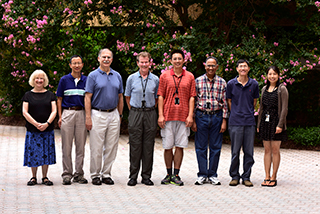May 9, 2023

Clinicians have long cited older age as the main risk factor for most neurodegenerative diseases, including Alzheimer’s and Parkinson’s. However, certain symptoms — such as loss of smell — may develop years or even decades earlier than the disease’s clinical diagnosis.
Honglei Chen, Ph.D., an NIEHS grantee at Michigan State University (MSU) College of Human Medicine, studies how the interplay between environmental factors and those early symptoms might shape disease development.
“There is a general lack of understanding when it comes to the aging process, and how neurodegenerative diseases develop in the context of aging and how our daily lives and environmental factors may play into it,” Chen said.
After earning degrees from TianJin Medical University and the Chinese Academy of Preventive Medicine in China, Chen pursued a Ph.D. in nutritional epidemiology at Tufts University in Boston, Massachusetts. That work led to a postdoctoral opportunity as a research fellow at the Harvard School of Public Health, where Chen became interested in how environmental risk factors affect neurological health.

In 2005, Chen joined the Epidemiology Branch of the Division of Intramural Research at NIEHS. There, he first learned about the Agriculture Health Study, a joint effort funded by NIEHS, the National Cancer Institute, and the U.S. Environmental Protection Agency to study how occupational exposures — like pesticide use — as well as lifestyle and genetic factors influence the health of farmers.
“The Agriculture Health Study is one of the best resources in the world to understand how farming and pesticide exposures may affect the risks of a variety of diseases, including Parkinson’s,” Chen said.
In 2012, Chen facilitated the Parkinson’s Disease Premotor Symptom Symposium at NIEHS, which identified major gaps within the field of neurodegeneration and informed how Chen would focus his studies. He decided to investigate the early stages, or prodromal phase, of Parkinson’s disease development, and how environmental and genetic factors may contribute. This phase occurs before the onset of typical symptoms, such as motor problems.
Warning Signs
Neurodegenerative diseases such as Alzheimer’s and Parkinson’s are difficult to diagnose and study because of decades-long development before the onset of serious symptoms, according to Chen. By identifying less apparent signs of the diseases earlier, researchers may ultimately be able to devise preventive strategies.
Through his research, Chen has noticed that many potential early indicators do not receive adequate attention because they are either rare or do not seriously affect everyday life. One of those early signs, according to various studies, is rapid-eye movement sleep behavior disorder, or RBD.
A characteristic of RBD is a tendency to physically act out dreams through sounds and sudden movements, described as dream-enacting behavior. Working with the Agriculture Health Study, Chen’s team found that farmers with a history of high pesticide exposures were more likely to report dream-enacting behaviors two decades later.
Although RBD is rare in the general population, many cases of RBD with no known cause eventually give way to Parkinson’s disease or related disorders, the researchers noted. Pesticides, their study suggested, may play a role in triggering the decades-long neurodegenerative process.
The Smell Test
Substantial olfactory loss — or impaired sense of smell — is another notable prodromal symptom of Parkinson’s. In 2017, Chen’s team found an association between poor scores on a smell test and higher risk of Parkinson’s disease in Black and White participants. The association was evident throughout the entire follow-up period of about 10 years, supporting the notion that smell loss is among the earliest symptoms of Parkinson’s disease, according to the authors.
Until their paper came out, studies looking at connections between smell and Parkinson’s disease had been conducted almost exclusively with White or Asian participants. However, their findings among Black participants warranted further investigation due to the small sample size, the authors noted.
Working with the Agricultural Health Study, Chen has also examined how exposure to pesticides may relate to sense of smell and neurological health. In 2020, Chen and colleagues reported the first evidence of associations between long-term occupational exposure to many individual pesticides and smell loss. NIEHS funding has allowed the team to continue building on that work, expanding their ability to connect with farmers via virtual exams for more detailed clinical assessments.
“We know so little about day-to-day risk factors for diseases like Parkinson’s and Alzheimer’s. We are hopeful that our research can work toward defining what early stages of neurodegeneration may look like, and what else prodromal symptoms like smell impairment may tell us about human health,” Chen said.
“In the future, maybe annual examinations will pay as much attention to someone’s sense of smell as they do to vision and hearing.”


